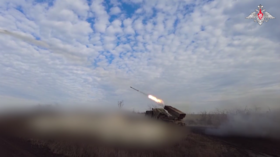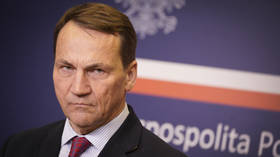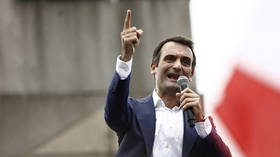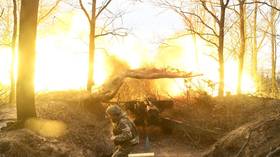Putin plunges into “plankton soup”
Russian Prime Minister Vladimir Putin has examined the depths of the world’s largest freshwater lake by volume - Baikal. He has been looking at how the research program into the ecosystem of the lake is progressing.
Saturday morning, Putin came to the special vessel Metropol, anchored two kilometers off the shore, from which the scientific research is carried out. The ship is equipped with submersibles, used for exploring the lake’s flora, fauna, and natural resources.
It takes just a few minutes for Vladimir Putin to dive nearly fourteen hundred meters (4,600 feet) and become the first Russian politician to reach the bottom of the world’s deepest freshwater lake.
The Prime Minister had to wear a special warm suit – the temperature inside the sub is about +17 degrees Celsius (62.6 degrees Fahrenheit).
Leaving his shoes behind – because there is no room for them inside the tiny submersible – there are smiles for the cameras before he vanishes from sight for the next four hours.
“[As for security concerns,] we have worked for many years without any serious emergency situations. But today we take some extra security measures,” the submarine operator, Evgeny Chernyaev, explains.
Putin said the bottom of the lake – which is the oldest and deepest in the world, containing 20 per cent of the world’s fresh water – looked very impressive but a bit murky.
”The water is certainly clean from the ecological point of view, but, in fact, it is a ‘plankton soup’, as I called it,” Putin told journalists during a communication session from the lake bottom.
Putin is no stranger to taking his job to extremes, having previously taken to the skies inside a Russian fighter jet. But, he says, plunging into Baikal was a new experience:
“I’ve never experienced anything like this – these feelings are special. Baikal’s bottom is so impressive – its natural environment and geology – this dive helped me have a fresh look at the ecological problems of Baikal, what we can do and what we cannot,” Putin said.
MIR submersibles
The odyssey was successfully completed. And it came as no surprise, since for over 20 years MIR-1 and MIR-2 – the Russian submersibles, Putin says he is proud of, – have operated without any failures and performed more than a thousand descents.
They are among only four in the world capable of diving to six kilometers, or more than 3.7 miles, which makes about 98% of the Earth’s sea and lake beds accessible to them.
The vehicles are manned by three people each and normally stay underwater for a maximum of 24 hours, although in emergencies there is enough air for three days.
It was these submersibles which took man to the geographic North Pole seabed for the first time, raising the Russian flag four kilometers (2.5 miles) below the surface. They have also traveled deep into the Atlantic to film the sunken Titanic.
Baikal's fragile ecosystem
But at Baikal, the focus is the environment.
It is a subject Putin has raised before. Then-president – in 2007 – he stopped a gas pipe from being built within the lake. Today, as Russia’s Prime Minister, ecology is no less of a concern for Putin.
“I saw with my own eyes that Baikal is in good condition,” he says. “And there have been no changes for the worse. Our task now is to prevent that from happening in the future, so we are going to listen to the environmentalists' warnings.”
“We will move towards finding a balance between nature preservation and the needs of local people,” Vladimir Putin added.
Putin’s dive comes during a large-scale exploration of the lake’s unique ecosystem. There have been more than 90 dives since last year, and another 30 are planned.
Vladimir Putin’s personal participation in such landmark events certainly helps boost his own popularity among ordinary Russians. But, the Prime Minister says that the main goal is to attract people’s attention to what is really important.
With this recent journey to the bottom of Baikal, it has become clear that Russia’s unique lake and the preservation of its unique ecosystem are now among the country’s priorities.












